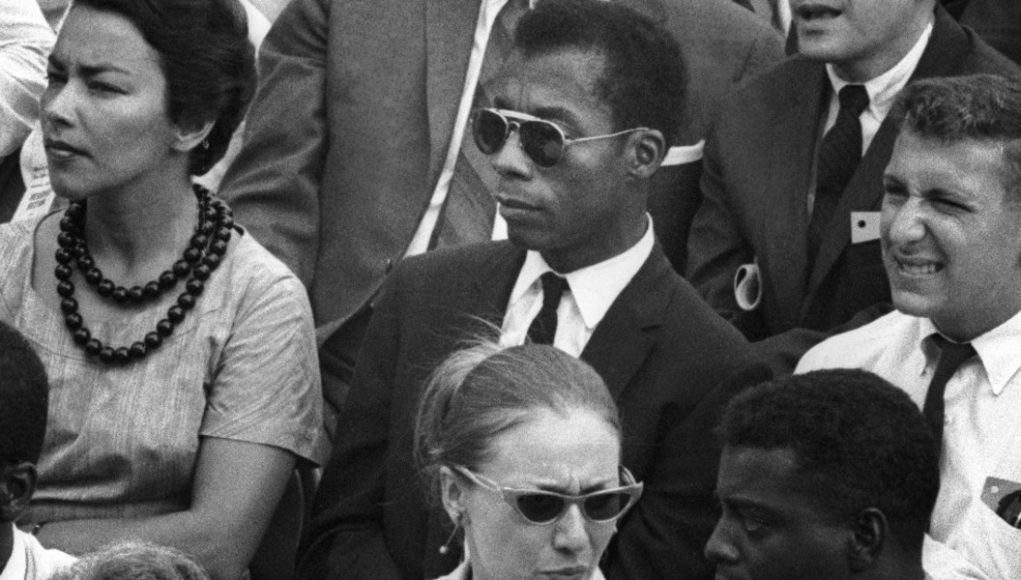By the time James Baldwin decided to write Remember This House in 1979, he had already been writing and speaking about race in America for nearly 30 years. Remember This House was to be a critique of the America that Baldwin had experienced, the America he knew, as told through the lives and deaths of his friends and contemporaries: Medgar Evers, Malcolm X and Martin Luther King, Jr.
The Harlem-born civil rights activist and writer did not complete this memoir by the time he passed away in France in 1987, but he did leave behind pages of his eloquent, unfinished work along with other letters, interviews and writings. These artifacts form the heart of I Am Not Your Negro, the stunning film by Raoul Peck, which has been nominated for the Academy Award for Best Documentary.
Gripping and difficult with imagery of what was and what is, this film is not made for just its initial impact, but its lasting effect and the disturbing prophecy of its central narrative – that our history is our present, and we cannot run away from it.
In this film, now playing in a limited engagement at Sundance Cinema, Peck gives us Baldwin’s exhaustive exploration and eloquent experience of race, of his sorrow, his rage and his fear for America and her citizens – both of what she denies, and the blissful ignorance she perpetuates.
Using letters from Baldwin to his editor and the 30 extant pages of Remember This House — both narrated by Samuel L. Jackson — along with archival interview film, Peck portrays not just Baldwin’s time but our own. Drawing striking parallels to marches, Hollywood films, atrocities and violence toward black Americans from the 1950s and 60s through our own era, Peck brilliantly channels what Baldwin attempted to tell his own generation: that this problem of race, this division of black and white will always be, if we continue to choose apathy and ignorance.
Peck does this with images of desegregation, the Civil Right movements, and various footage of Baldwin’s interviews across the country as he attempted to discuss the problem of race in our own living rooms. Baldwin is able to knowingly portray the central and paradoxical duality at the center of our race problem: white America must systematically and unconsciously create the other as something to be both powerless and fearsome. The other was the Native American at first, then the black American. This comes at a cost to the white conscience, which then black Americans are responsible to ease with the image of the Happy Negro, of the prosperous black family and the promise of a future where we can all get along – perhaps even a future in which a black man could be president.
This is apparent of course not only in black America, but — as Peck visually leads the audience through using the strength of Baldwin’s words — we still apply this paradox to any other: immigrants, refugees, women, LGBTQ.
Peck is able to draw this parallel using events that took place just a year or two ago using current footage of Ferguson, of Baltimore, of Trayvon, of Black Lives Matter. It’s as if Baldwin is critiquing our present, as if he’s here with us – exhausted and disheartened at the Breaking News updates on our phones or in our news and social media feeds. Peck gives us Baldwin’s near-tangible weariness in our own, current lives.
Also of note is Samuel L. Jackson’s voice performance. It’s surprising how he is able to set aside the very recognizable rhythm and timbre of his voice and manner of speech to portray the exhaustion and pain of Baldwin’s journey. It’s Jackson’s performance, but it’s unmistakably Baldwin’s voice.
This film is not easy to sit through. You will hear gasps. You’ll notice some wiping away their tears. You may find yourself sitting back in horror, leaning forward with the knowing of experience and familiarity of what is put before you on a larger than life screen. Or you may sit there in a quiet rage, or in a quiet shame – knowing that you have been either the ignorant or the ignored.
James Baldwin may not have been a household name, but his words and insight will haunt you. You will be shaken, maybe even distracted into thinking about what role you have played or what part you can change.
This remarkable film is available at Sundance Cinema in Madison through February 24. This is the only scheduled screening in any part of Wisconsin. You have a limited chance to experience this film, and I strongly urge you to take it.










